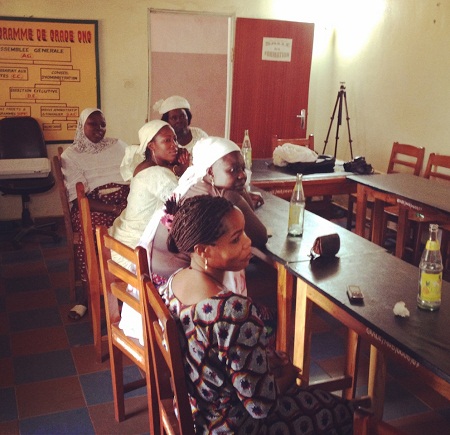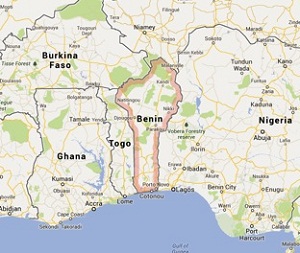Healthy Foods and New Jobs, Part 2: Infrastructure matters
Editor’s note: This is the second of a two-part blog about MamaCarts, a food cart venture that sells nutritiously complete meals to address chronic malnutrition in growing urban and peri-urban markets. In part one, MamaCarts Co-Founder Rachael Miller looked at some of the lessons learned in launching the venture from scratch in Benin, West Africa. In part two, Miller delves into a few of the infrastructure challenges the team is encountering.
In my previous blog post, I discussed the market opportunities created by system failures at the MamaCarts pilot site in Benin, West Africa. This post will discuss some of the challenges our team has encountered thus far, specifically related to infrastructure. This list is certainly not meant to be exhaustive, but rather highlights the primary pain points that hinder our progress at an institutional level. Discovering the ways communities work around these challenges has been part of the journey to creating a uniquely “For Benin, By Benin” value proposition and product for MamaCarts’ consumers.
Incorporation – Benin is not the easiest country in which to do business. While the world of “social enterprise” has seemingly exploded and Twitter is awash with #socent hashtags, in Benin, as in much of West Africa, there is no legal structure to support a for-profit business pursuing a triple bottom line philosophy.
 There are two roads an organization can take: register either as a for-profit or nonprofit. Each option carries positives and negatives. Regardless of the country one is working in, this is a very difficult decision for an organization. Dividing ownership versus cost of startup capital versus long-term vision … the decision calculus is mind-boggling. It took several months of deliberation and an honest articulation of if/when we wanted an exit strategy to arrive at our present incorporation status. And that just meant we were able to begin the paperwork process. Finally, we decided to register as a tax-exempt nonprofit in Benin.
There are two roads an organization can take: register either as a for-profit or nonprofit. Each option carries positives and negatives. Regardless of the country one is working in, this is a very difficult decision for an organization. Dividing ownership versus cost of startup capital versus long-term vision … the decision calculus is mind-boggling. It took several months of deliberation and an honest articulation of if/when we wanted an exit strategy to arrive at our present incorporation status. And that just meant we were able to begin the paperwork process. Finally, we decided to register as a tax-exempt nonprofit in Benin.
(A MamaCarts vendor focus group in Benin, left.)
Sanitation – There is no shortage of facts linking poor sanitation and development difficulties. The fact remains that without access to potable water, communities are stymied and collective productivity is hindered. While we have committed to using only filtered and boiled water for MamaCarts meals, that does little to improve the overall system for other street food vendors who need water to prepare meals and serve consumers on a daily basis. Additionally, during certain seasons, water shortages can leave taps dry for days or weeks at a time, forcing some to gather contaminated water from nearby rivers and ponds left over from the rainy season.
Government – While our initial market survey demonstrated that, indeed, consumers want a change in street food quality, we realize they need to trust the product. This means engaging local officials who are excited about this mission and willing to support clean and healthy food via policy enforcement. Some food safety regulations already exist; however, the federal and state resources to execute these regulations are spread too thin to make an impact. Certain government initiatives are already vastly under-resourced and these entities have little extra time and few additional employees to commit to yet another public health concern.
 But wait! There’s a positive spin on these infrastructure gaps: Alternative solutions do exist and people circumnavigate these difficulties on a daily basis.
But wait! There’s a positive spin on these infrastructure gaps: Alternative solutions do exist and people circumnavigate these difficulties on a daily basis.
Our primary assumption during our one-year pilot has been that the pieces of the puzzle are already in Benin to improve street food quality. Six months into our pilot, we’re right on target with this assumption. This doesn’t mean it’s easy to connect said pieces. For example, it can be incredibly frustrating to know that just 50 miles away a fantastic gardening project is looking for a market for their fresh vegetables, but we simply can’t regularly access them due to road conditions.
While our team is not equipped to reconstruct roads, install citywide sewage systems or overhaul the legal system, the fact that we are small and nimble means we can change quickly to operate in the face of these difficulties. The remainder of this year will be spent focusing on organizational structure, food cart and menu design, nailing down our monitoring and evaluation strategy, and realizing how to overcome the aforementioned challenges before we expand to another location.
Have you or your organization encountered similar challenges? We’d love to hear about similar groups out there, regardless of location, who are adapting to local challenges.
Rachael Miller is a MamaCarts co-founder and street food evangelist.
- Categories
- Agriculture, Education, Health Care, Social Enterprise
